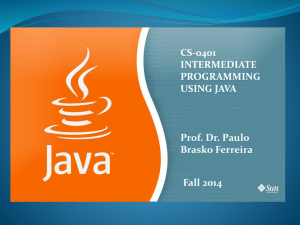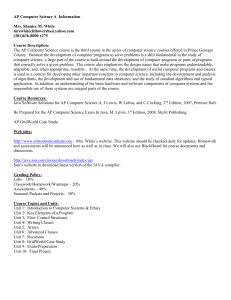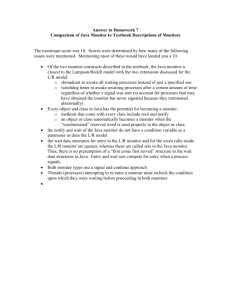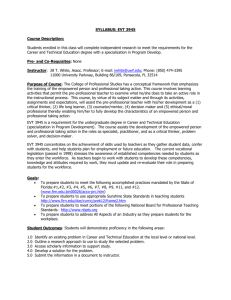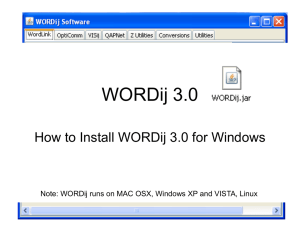cs220 51 sp 10 sylb
advertisement
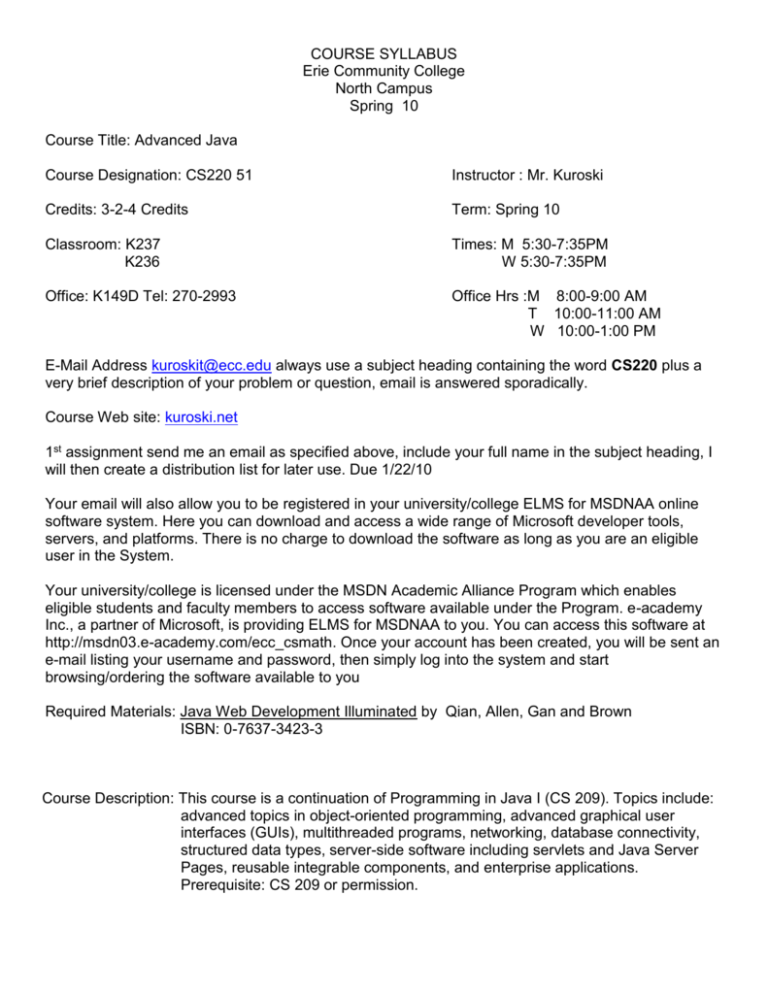
COURSE SYLLABUS Erie Community College North Campus Spring 10 Course Title: Advanced Java Course Designation: CS220 51 Instructor : Mr. Kuroski Credits: 3-2-4 Credits Term: Spring 10 Classroom: K237 K236 Times: M 5:30-7:35PM W 5:30-7:35PM Office: K149D Tel: 270-2993 Office Hrs :M 8:00-9:00 AM T 10:00-11:00 AM W 10:00-1:00 PM E-Mail Address kuroskit@ecc.edu always use a subject heading containing the word CS220 plus a very brief description of your problem or question, email is answered sporadically. Course Web site: kuroski.net 1st assignment send me an email as specified above, include your full name in the subject heading, I will then create a distribution list for later use. Due 1/22/10 Your email will also allow you to be registered in your university/college ELMS for MSDNAA online software system. Here you can download and access a wide range of Microsoft developer tools, servers, and platforms. There is no charge to download the software as long as you are an eligible user in the System. Your university/college is licensed under the MSDN Academic Alliance Program which enables eligible students and faculty members to access software available under the Program. e-academy Inc., a partner of Microsoft, is providing ELMS for MSDNAA to you. You can access this software at http://msdn03.e-academy.com/ecc_csmath. Once your account has been created, you will be sent an e-mail listing your username and password, then simply log into the system and start browsing/ordering the software available to you Required Materials: Java Web Development Illuminated by Qian, Allen, Gan and Brown ISBN: 0-7637-3423-3 Course Description: This course is a continuation of Programming in Java I (CS 209). Topics include: advanced topics in object-oriented programming, advanced graphical user interfaces (GUIs), multithreaded programs, networking, database connectivity, structured data types, server-side software including servlets and Java Server Pages, reusable integrable components, and enterprise applications. Prerequisite: CS 209 or permission. Course Objectives: At the completion of the course, students should be able to: 1. Design, write, debug, and execute Java programs, namely applets and applications, using an object-oriented approach. 2. Use the existing standard Java class libraries and their Application Programming Interfaces (APIs) to develop Java programs. 3. Design, write, and debug Java programs that include advanced graphical user interface (GUI) components. 4. Design, write, and debug Java programs that include advanced GUI layout managers. 5. Design, write, and debug multithreaded Java programs. 6. Design, write, and debug Java programs that implement a client-server design for use on computer networks, both LANs and WANs. 7. Design, write, and debug Java programs that include the development and use of structured data types. 8. Design, write, and debug Java programs that incorporate Java Database Connectivity. 9. Design, write, and debug Java programs that include the use of Remote Method Invocation (RMI). 10. Design, write, and debug JavaBeans for reuse and integration into programs written by other developers. 11. Design, write, and debug Java programs that consist of applications in other disciplines such as the sciences, engineering, and business. 12. Write documentation that is included in the internal program modules. Competencies: COMPETENCIES RELATED COURSE OBJECTIVES 1. Identify all the steps of the software system life cycle and perform problem analysis, the topdown stepwise refinement design process, coding, and testing. 1 - 10 2. Write, execute, and debug programs in high-level languages, an assembly language, and/or hybrid programs. 1 - 10 3. Explain the concept of an abstract data type (structure) and design such data types for use in programs. 1 - 10, especially 1, 2, 7, 8 Course Design: 1) Meeting Times MW 5:30 to 7:35PM. 2) Homework is assigned regularly and must be done to pass this course. Homework is very important. It’s a chance you have to practice & learn the material. Homework will be collected and graded. Late homework is not accepted. If you can’t make it to class then email the homework using the email rules. Some test questions are very similar to the homework questions, so doing homework definitely results in higher grades. (HW assignments will be posted on the course web site ) 3) Tests are given at the completion of chapters or related chapters. Tests are announced in advance and cannot be missed (N.B. except in exceptional circumstances). A grade of zero is given for missed tests. Make-ups for missed tests must be scheduled within 1 week of the original test date, 15 pts is automatically deducted on make-ups scheduled more than 1 week after the original test’s date. It is a student’s responsibility to set up a date/time with the instructor for this purpose & to provide written documentation as to the reason for the absence. There will be two tests and one final cumulative exam (the final counts as 2 regular tests for average purposes i.e. score is doubled). Tests will be given on angel.ecc.edu. LABS: There are weekly lab exercises with questions that need to be answered or programs that need to be written. These are due the next lab period. No lates are accepted. The labs are to be submitted by email in a zipped format. PROJECTS: none Grading Procedure: Your semester average will be determined by using the following weighting: Labs 50% Hour tests & final 50% Homework bonus 10% Your final grade will be a mean average of the three weighted components listed above. These letter grades are assigned for the associated numeric average: A (100 - 90) B (89 - 80) C (79 - 70) D (69 - 60) F (below 60) +/- grades will be given where appropriate Students with Disabilities: Any student who requires accommodations to complete the requirements & expectations of this course because of disabilities (physical or mental) is invited to make their needs known to the instructor and the Counselor for Students with Disabilities : Heather Hewson office: S205 phone: 851-1495 email: hewson@ecc.edu GENERAL COMMENTS: It is the student's responsibility to keep up with the readings, homework, lab assignments and projects. If you are having trouble with your programming, do not wait until the last minute to seek help. Ask questions! Attendance Policy: Attendance is required and taken for every class. Regular attendance is necessary to pass this course. Poor attendance & failure to do homeworks, labs and projects are the major causes of failure. You are responsible for all material covered during an absence. If you are late to class, you must notify me at the end of class otherwise you will be marked as being absent. Classroom "etiquette" expectations: Attend classes and pay attention. Do not ask the instructor in class to go over material you missed by skipping a class or not concentrating. Do not come to class late or leave early. If you must enter a class late, do so quietly and do not disrupt the class by walking between the class and the instructor. Do not leave class unless it is an absolute necessity. Do not talk with other classmates while the instructor or another student is speaking. If you have a question or a comment, please raise your hand, rather than starting a conversation about it with your neighbor. Show respect and concern for others by not monopolizing class discussion. Allow others time to give their input and ask questions. Do not stray from the topic of class discussion. Do not eat and/or drink during class time. Before entering class turn off all electronics: cell phones, pagers, and beeper watches. These devices are disruptive to the class and their use during a lecture is rude to the class and instructor. No cell phones should be in your hands during class. This means no fiddling with your phones, reading/sending text messages, etc. If you are expecting an important phone call, do not attend class. Penalty for cell phone abuse during class: 5 points/incident subtracted from your final grade A student who really abuses this policy will be given a final grade of F Avoid audible and visible signs of restlessness; these are both rude and disruptive to the rest of the class. Focus on class material during class time. Sleeping, talking to others, doing work for another class, reading the newspaper, checking email, and exploring the internet are unacceptable and can be disruptive. Do not pack book bags or backpacks to leave until the instructor has dismissed class. Don’t ask,” What are my grades?” You should save all tests and graded assignments & know how you are doing in the course. Don’t ask,” Do you drop the lowest grade?” No, I don’t. Please act like a mature adult at all times – this is not grade or high school. It’s not required by law that you be in this class; you’re free to leave at any time but I hope you will stay & learn to enjoy ( maybe even LOVE ! ) computer programming. Last Date for Official Withdrawal: Monday April. 12, 2010 Other Important Dates: President Days MT 2/15&2/16 Spring Recess Th 4/1 til 4/10 Last Class Day of the Semester Wed. 5/12 Cheating and Plagiarism Policy: Cheating on tests, graded assignments, and projects will not be tolerated. A first offense will result in an F grade on the assignment for both "giver" and "receiver". A second offense will result in an automatic grade of F for the course. Cheating includes copying electronically as well as by hand. Never leave your disks or printouts lying around. In the instance of suspected cheating or plagiarism, the instructor must inform the student of the alleged misconduct. The instructor may then dismiss the student for the course with such action carrying with it the issuance of an automatic F. Following the dismissal from the course, the student has the right to appeal such sanction through the student grievance procedure.

